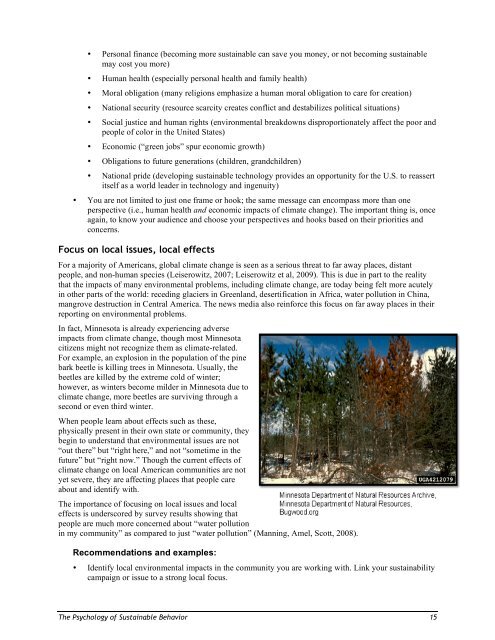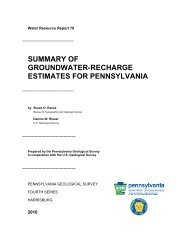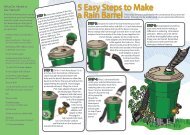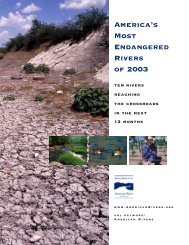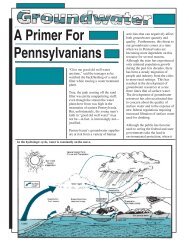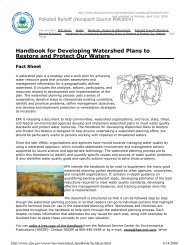The Psychology of Sustainable Behavior - Minnesota Pollution ...
The Psychology of Sustainable Behavior - Minnesota Pollution ...
The Psychology of Sustainable Behavior - Minnesota Pollution ...
You also want an ePaper? Increase the reach of your titles
YUMPU automatically turns print PDFs into web optimized ePapers that Google loves.
• Personal finance (becoming more sustainable can save you money, or not becoming sustainable<br />
may cost you more)<br />
• Human health (especially personal health and family health)<br />
• Moral obligation (many religions emphasize a human moral obligation to care for creation)<br />
• National security (resource scarcity creates conflict and destabilizes political situations)<br />
• Social justice and human rights (environmental breakdowns disproportionately affect the poor and<br />
people <strong>of</strong> color in the United States)<br />
• Economic (“green jobs” spur economic growth)<br />
• Obligations to future generations (children, grandchildren)<br />
• National pride (developing sustainable technology provides an opportunity for the U.S. to reassert<br />
itself as a world leader in technology and ingenuity)<br />
• You are not limited to just one frame or hook; the same message can encompass more than one<br />
perspective (i.e., human health and economic impacts <strong>of</strong> climate change). <strong>The</strong> important thing is, once<br />
again, to know your audience and choose your perspectives and hooks based on their priorities and<br />
concerns.<br />
Focus on local issues, local effects<br />
For a majority <strong>of</strong> Americans, global climate change is seen as a serious threat to far away places, distant<br />
people, and non-human species (Leiserowitz, 2007; Leiserowitz et al, 2009). This is due in part to the reality<br />
that the impacts <strong>of</strong> many environmental problems, including climate change, are today being felt more acutely<br />
in other parts <strong>of</strong> the world: receding glaciers in Greenland, desertification in Africa, water pollution in China,<br />
mangrove destruction in Central America. <strong>The</strong> news media also reinforce this focus on far away places in their<br />
reporting on environmental problems.<br />
In fact, <strong>Minnesota</strong> is already experiencing adverse<br />
impacts from climate change, though most <strong>Minnesota</strong><br />
citizens might not recognize them as climate-related.<br />
For example, an explosion in the population <strong>of</strong> the pine<br />
bark beetle is killing trees in <strong>Minnesota</strong>. Usually, the<br />
beetles are killed by the extreme cold <strong>of</strong> winter;<br />
however, as winters become milder in <strong>Minnesota</strong> due to<br />
climate change, more beetles are surviving through a<br />
second or even third winter.<br />
When people learn about effects such as these,<br />
physically present in their own state or community, they<br />
begin to understand that environmental issues are not<br />
“out there” but “right here,” and not “sometime in the<br />
future” but “right now.” Though the current effects <strong>of</strong><br />
climate change on local American communities are not<br />
yet severe, they are affecting places that people care<br />
about and identify with.<br />
<strong>The</strong> importance <strong>of</strong> focusing on local issues and local<br />
effects is underscored by survey results showing that<br />
people are much more concerned about “water pollution<br />
in my community” as compared to just “water pollution” (Manning, Amel, Scott, 2008).<br />
Recommendations and examples:<br />
• Identify local environmental impacts in the community you are working with. Link your sustainability<br />
campaign or issue to a strong local focus.<br />
<strong>The</strong> <strong>Psychology</strong> <strong>of</strong> <strong>Sustainable</strong> <strong>Behavior</strong> 15


